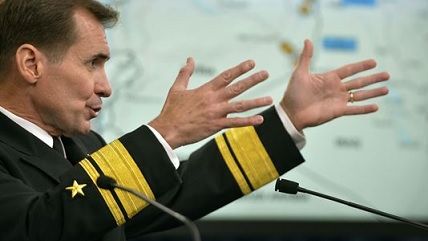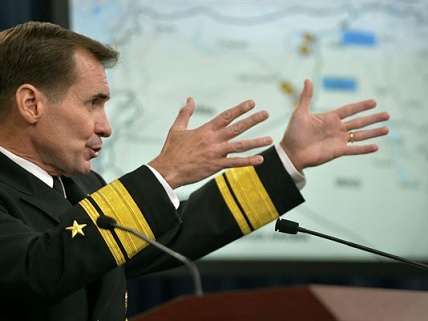CIA-Backed Syrian Rebels Fighting Pentagon-Backed Syrian Rebels
The Pentagon resumed funding and training rebels this month.


The United States continues to fund rebels on the ground in Syria's five-year-long civil war, with President Obama a few weeks ago authorizing the Pentagon to resume training and arming Syrian rebels meant to fight the Islamic State (ISIS).
But Pentagon-backed rebels and CIA-backed rebels in Syria have increasingly found themselves fighting each other, as the Los Angeles Times reports, with multiple skirmishes between Aleppo and the Turkish-Syrian border in recent days. And Pentagon funding of rebel groups had been suspended after U.S.-trained rebels handed their weapons over to an Al-Qaeda affiliate last September.
The fighting between U.S.-backed rebels illustrates the confused, counter-productive, and costly foreign policy the Obama administration has been pursuing in Syria. The policy has met little legislative resistance in Congress, which continues its decades-long trend of ceding its role in foreign policy to the executive branch, and a bit more resistance on the campaign trail.
Republican presidential candidate Texas Sen. Ted Cruz voted against arming Syrian rebels in 2014, saying the U.S. didn't have a "dog in the fight" in Syria. Instead, Cruz proposes doubling down on the aerial campaign against ISIS and funding Kurdish fighters instead. Sen. Jeff Sessions (R-Ala.), a relatively early Washington supporter of Republican frontrunner Donald Trump, also voted against arming Syrian rebels, and Trump himself called the move to arm them a "mistake" back in 2014.
On the Democratic side, Hillary Clinton, Obama's first secretary of state, has offered a "stay the course" approach toward Obama administration foreign policy in Syria and elsewhere. Sanders, despite acknowledging unintended consequences, has largely done the same, reiterating his support for arming Syrian rebels as recently as last October, after the program had been suspended because of problems like weapons ending up in the hands of terrorist groups.
Candidates on both sides have expressed a desire for the U.S. to back foreign troops on the ground in the broader campaign against ISIS. While Republicans tend to paint this as a break from the Obama administration, Democrats offer the same position, framing it as a continuation of Obama's foreign policy.
And Democrats' nonchalant approach to arming hostiles in a civil war is particularly noxious given their stance at home not just on gun control but on money in politics as well. Democrats (and Donald Trump) warn that Americans spending freely on political speech has an undue effect on the electoral process, despite the failure this cycle of "big money" candidates like Jeb Bush to move the needle of public opinion at all. If politics is "war by other means," civil wars represent a break-down of the political system. Hillary Clinton is as enthusiastic about muzzling Americans opposed to her at home as she is arming Syrians opposed to their leaders abroad.


Show Comments (55)